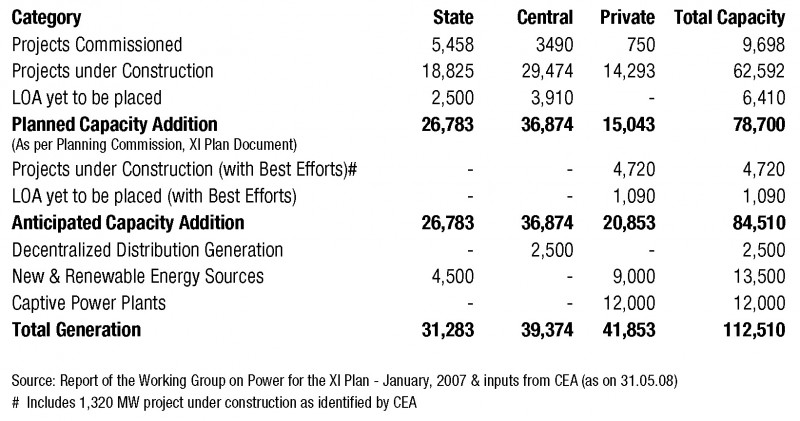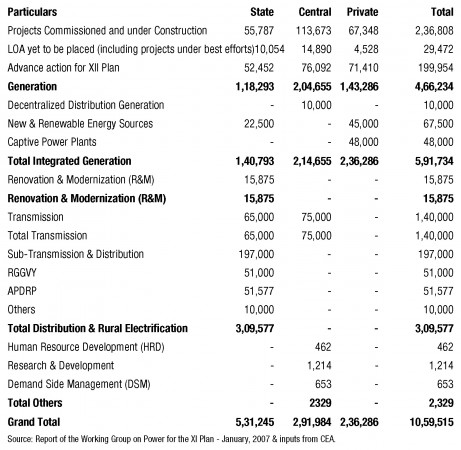The UPA government seems to be napping. Caught on the wrong foot where national security is concerned, the government has also chosen to ignore a key sector for economic growth — POWER
That the UPA government was caught sleeping on the job in regard to national security and combatting terrorism from home grown and external outfits was clearly demonstrated on November 26 in Mumbai.
The terrorist attacks have done more than claim the lives of more than 150 people and destroy premium hotel property worth crores of rupees. They have shaken the confidence of Mumbai’s and India’s business community that is already reeling under the impact of the global financial crisis and resulting recession in India. This community that has been the driver of India’s remarkable GDP growth over the past few years is in for another shock.
The UPA government has been sleeping on the job on another aspect of governance that is integral to economic growth – energy.
Even though India’s GDP growth has slowed and the prices of crude oil have dropped to close to $ 40 this week from a dizzying height of $147 in July this year, India’s demand for energy is only going to increase and a gap in supply will only hobble industry, development and growth further.
Energy requirement for industry, services and agriculture is a crucial input for development. According to the Planning Commission, India’s total primary requirement is likely to grow four to five times and electricity requirement is likely to grow six to seven times over the next 25 years to sustain nine per cent GDP growth. Let’s put that into perspective: the current power generation capacity in India is 146,725 MW which barely meets the current demand. The expected requirement by the year 2031-32 is projected to be 8,80,350 MW.
And what has the government been doing about this gigantic problem? The answer is not very hard to come by – they have been having meetings. In fact recently the full Planning Commission – all 39 members – met at the Prime Minister’s residence to discuss something called the Integrated Energy Policy that in Manmohan Singh’s words is “critical” for the country’s energy security.
One can only expect that if the Prime Minister deems a policy to be “critical” for our country the policy will be implemented immediately. Unfortunately in this government “critical” and “immediate” are words that translate into “at the Enegry Coordination Committee, the Cabinet Secretary had been directed to discuss with the concerned ministries the implementation of these recommendations. The recommendations were comprehensively discussed and some progress has been made in implementing some of the recommendations by the concerned ministries.” Is it surprising that even though an expert committee, constituted under Dr Kirit Parikh, Member (Energy) Planning Commission, had submitted its report in 2006 suggesting an Integrated Energy Policy, the policy is far from being implemented and is still being discussed?
At the same meeting of the full Planning Commission the ever-efficient Deputy Chairman of the Planning Commission, Montek Singh Ahluwalia, did what he does best. He made a Power Point presentation covering “focus areas on Integrated Energy Policy.” The full Planning Commission meeting in addition to Manmohan Singh who is its chairman and Montek Singh was attended by power minister, Sushil Kumar Shinde, petroleum minister Murli Deora, minister of science and technology Kapil Sibal, new and renewable energy minister Vilas Muttemwar, Santosh Bagrodia, minister of state for coal, all the Planning Commission members, the entire PMO and Secretaries and officials of other ministries and departments.
Montek Singh made astute observations such as “globally energy prices are rising” and suggested that domestic prices have to reflect these changes. And then he dropped a bomb by stating that by 2031-32 India’s import dependence for energy will be in the range of 58 to 67 per cent.
He suggested that the energy market should be competitive and the prices must be market determined, which was an echo of the Prime Minister’s observation that energy pricing is a key component of energy policy and that the inconsistencies in policies relating to individual energy sectors, set by a number of different ministries, should be removed. In addition to calling for substantial private investments in the energy sector the deputy chairman emphasised that the subsidy on energy for the poor also needs to be redesigned. He also said that subsidies on LPG, kerosene and other fuels were not viable.
Along with Montek Singh’s call to private players the other ministers present also suggested that tax and fiscal regimes both at the Centre and state levels, on different forms of energy should be uniform so that they lead to optimal choice of fuels and technology and also encourage private sector investment. At the moment private participation in power generation projects that have already been commissioned is 750 MW compared to 8,948 MW by the central and state governments. In projects under construction private participation is to the tune of 14,293 MW as compared to 48,299 MW by the central and state governments.
The central government has initiated an ambitious plan to provide ‘Power for All’ by 2012 that will see an increase in power generation capacity to 2,00,000 MW over the next three years. It has taken 50 years to reach the current installed capacity and the government hopes to add 53,725 MW over three years. To call this plan ambitious is an understatement to say the least as at the moment the total capacity of projects commissioned by state, Central and private players is only 9,698 MW. Projects under construction total 62,592 MW and projects for which a Letter of Award (LOA) has yet to be placed total 6,410 MW.
While the total planned power generation capacity addition is 78,700 MW it is anybody’s guess as to when any of these projects will come on line. At best one can expect the commissioned projects to come online within the Power for All deadline of 2012. Even that will leave a shortfall of 44,027 MW. When the government can not even manage to ensure power generation capacity addition of 53,725 MW through an ambitious Power for All by 2012 plan how in the world is it going to ensure that 7,33,625 MW is added over 25 years?


 Prime Minister Manmohan Singh (right) and Deputy Chairman of Planning Commission Montek Singh Ahluwalia
Prime Minister Manmohan Singh (right) and Deputy Chairman of Planning Commission Montek Singh Ahluwalia